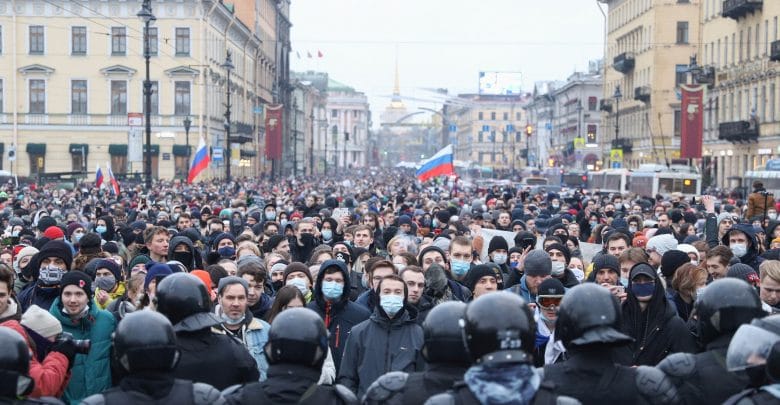
Aleksei Navalny Is Resisting Putin, and Winning
The opposition leader was sentenced to prison, but he has mobilized a vast movement that’s not done growing.
A Russian court on Tuesday opened a new and fateful stage in the gripping power struggle between Aleksei Navalny, Russia’s tough-talking and internet-savvy opposition leader, and President Vladimir Putin, by sentencing Mr. Navalny to his first serious stint in prison.
On the face of it, this would appear to be a clear victory for Mr. Putin, who has effectively proclaimed himself president for life. With his total control of the courts, the police, the official media and all sorts of sophisticated tools — including lethal chemical agents — Mr. Putin can keep Mr. Navalny in prison forever or arrange a fatal “accident” if he chooses to.
But in this David v. Goliath saga, the 44-year-old Mr. Navalny has succeeded through raw courage and perseverance in putting Mr. Putin on the defensive. The imprisonment was Mr. Navalny’s move. Mr. Putin had tried for years to give him only brief sentences to avoid making him a martyr. But by voluntarily returning from convalescence in Germany, and then releasing a devastating YouTube video showing the obscenely opulent palace Mr. Putin was building himself on the Black Sea, Mr. Navalny left the president little choice but to dispatch him to a labor camp, and thus transform him into a powerful symbol of resistance.
The Kremlin attempted to give the court proceedings a veneer of legitimacy by moving them to a large courtroom in central Moscow and allowing Mr. Navalny to do all the talking he wanted to. But the outcome was preordained: Mr. Navalny was accused of violating parole from a 2014 conviction that the European Court of Human Rights had debunked as “arbitrary and manifestly unreasonable.” The accusation served to underscore the main reason Mr. Navalny couldn’t make the requisite visits to the authorities: Evidence suggests he was nearly poisoned to death in August by the secret police. He was subsequently evacuated to Germany.
It was Mr. Navalny in the glassed-in prisoner’s dock. But it was Mr. Putin and his corrupt cohort who were on trial behind the army of riot police officers gathered in central Moscow to prevent the sort of mass protests across all of Russia that followed Mr. Navalny’s return to his country on Jan. 17. “Hundreds of thousands cannot be locked up,” Mr. Navalny declared from court to his millions of followers on social media. “More and more people will recognize this. And when they recognize this — and that moment will come — all of this will fall apart, because you cannot lock up the whole country.”
Mr. Putin will go down in history, Mr. Navalny said in court, “as nothing but a poisoner.”
Massive police repression and winter frosts may quell the demonstrations. But the vast movement Mr. Navalny has mobilized is quantitatively different from earlier opposition forces, and still growing. The opposition now has 40 offices across Russia, and most of its millions of followers are young people who have not challenged the Kremlin before. Among people ages 18 to 24, Mr. Putin’s popularity has slid from 36 percent in December 2019 to 20 percent.
The Biden administration and European governments were quick to condemn Mr. Navalny’s imprisonment and may follow that up with more sanctions against Mr. Putin and his lieutenants. That would be well deserved. But Mr. Putin would do well to see that the fiercest challenge to his crooked rule is not from abroad, but from Russian citizens who seek and speak the truth.
